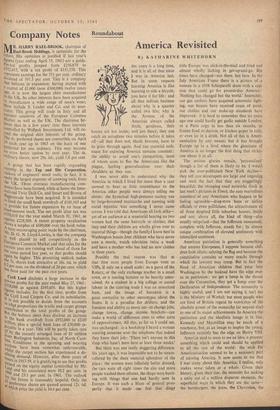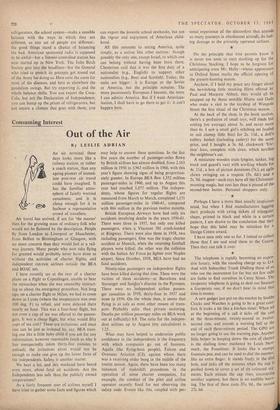Roundabout
America Revisited
By KATHARINE WHITEHORN I was never able to understand why the America in which I lived for more than a year seemed to bear so little resemblance to the America other people were always telling me about: the hysterical high-pressure society run by large-bosomed matriarchs and teeming with social injustice was something I never came across. I was told that Americans all look alikeā yet of an audience at a senatorial hearing no two women had the same hairstyle or clothes; that they and their children are wholly given over to material thingsāthough the family I know best in Washington boasts four children who have never seen a movie, watch television twice a week and have a mother who has had no new clothes in three years.
Possibly the real reason was that at that time most people from Europe went as VIPs, if only on a small scale : as a guest of the Rotary, or the only exchange teacher in a small town, or a touring lecturer to be heavily enter- tained. As a student in a big college or casual labour in the catering trade I was an unnoticed bum, and the image of . bumdom is a great corrective to other stereotypes about the States. It is a paradise for drifters, and the freedom and ability to move onāto change jobs, change towns, change income bracketsācan make a world of difference even to other sorts of oppressiveness. All this, as far as I could see, was unchanged: in a bookshop I heard a woman assuring someone over the telephone that indeed they knew their job: 'There isn't anyone in this shop who hasn't been here at least three weeks.'
But there was one really staggering difference. Six years ago, it was impossible not to be steam- rollered by the sheer material splendour of the place : the women were infinitely better dressed, the cars were all eight times the size and more people washed them oftener, the shops were burst- ing with things that one had hardly seen in Europe. It was such a blaze of general pros- perity that it made one feel that dingy little Europe was stick-in-the-mud and tired and almost wholly lacking in get-up-and-go. But times have changedānot there, but here. In the July American Vogue there is a picture of a woman in a 1938 Schiaparelli dress with a cap- tion that could go for present-day America : `Nothing has changed but the world.' Insensibly, our gas cookers have acquired automatic light- ing, our houses have received coats of paint, our clothes and our make-up standards have improved: it is hard to remember that six years ago one could hardly get garlic outside London, or a Paris copy in less than six months, or frozen food or dacron, or kitchen paper in rolls, or even ice in a drink. Not all of this is Ameri canisation by any means; but it has brought Europe up to a level where the glossiness of America is no longer the first thing that strikes one about it at all.
The serious glories remain, 'personalised' though a list of them is likely to be. I would pick the over-publicised New York skylineā they tell you skyscrapers are large and imposing and omit the fact that they are staggeringly beautiful; the sweeping road networks (look at last week's pictures in Time); the easy marvellous sunniness of any Americans who happen to be feeling agreeableādrug-store boys or airline officials or even politicians; the attractiveness of all those despised little suburban houses, inside and out; above all, the kind of thingāalso usually.misprisedāthat the Jefferson monument, complete with Jefferson, stands for: its almost unique combination of elevated sentiments with intensified sentiment.
American patriotism is generally something that amuses Europeans, I suppose because chil- dren look idiotic saluting the flag and because the constitution contains so many cracks through which the lawyers may creep. But in fact the flood of American children that pour into Washington by the busload have the edge over us in patriotism: we get a lump in the throat over the Coronation, they get a lump over the Declaration of Independence. The monarchy is highly useful, and I am not saying it isn't (so is the Ministry of Works); but most people who are fond of Britain regard its restriction of the absolute power of the monarchy (or anyone else) as one of its major achievements. In America the patriotism and the idealistic image is in line. Kennedy and Macmillan may be much of a muchness, but, as an image to inspire the young, Jefferson certainly has the edge on Henry V111.
America used to seem to me an idea, a process: something which could and should be applied to all the rest of the world: the wish for Americanisation seemed to be a necessary part of adoring America. It now seems to me that I was crazy about this. America, I realise, only makes sense taken as a whole. Given their history, given their size, the necessity for making a unity out of a million disparate elements, the superficial ways in which they are the sameā the hamburgers, the jeans, the Chevrolets, the refrigerators, the school systemāmake a sensible balance with the ways in which they are different, as any set of people are different: the good things stand a chance of balancing the bad. American sponsored radio is supposed to be awfulābut a listener-controlled station has now started up in New York. The John Birch Society gets into the headlinesābut the General who tried to preach its precepts got tossed out of the Army for doing so. Here exist the cures for most of the diseases, and here as elsewhere the pendulum swings. But try exporting it, and the whole balance shifts. You can export the Coca- Cola, but not the Declaration of Independence; you can bump up the prices of refrigerators, but not ensure a climate that goes with them; you can export the juvenile school textbooks, but not the vigour and enjoyment of American child- hood.
All this amounts to seeingā¢ America, quite simply, as a nation like other nations: though possibly the only one, except Israel, to which one can belong without having been born there. Chesterton said that it was the first duty of a nationalist (e.g., English) to support other nationalists (e.g., Boer and Scottish). Today, the units are bigger: it is Europe or the Soviet or America; but the principle remains. The more passionately European I become, the more I can admire America. But if I want American- isation, I shall have to go there to get it: it can't happen here.







































 Previous page
Previous page